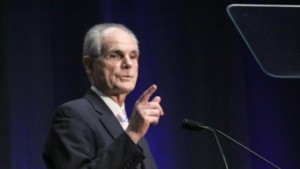SAN JOSE — City officials Friday announced tentative settlements on Measure B pension reforms with eight unions, bringing San Jose closer to replacing the controversial measure voters approved in 2012 that slowed the growth in retirement costs but launched a lengthy legal battle and employee exodus.
All but one of the city’s 11 employee unions have signed a proposed settlement to drop Measure B lawsuits and accept a negotiated compromise on their retirement benefits.
“I’d like to have the California Supreme Court have a chance to tell us what the rules really are for what are considered vested retirement benefits in California,” Reed said Friday.
But Liccardo, a Reed ally who had backed the measure and campaigned to defend it, opened the door to settlement talks after taking office.
The agreement announced Friday upholds parts of Measure B while abandoning others. It maintains the elimination of retiree bonus checks — offering $390 million savings over 30 years. And it brings new hires into a new, scaled-back retirement benefits plan, though one more generous than Measure B permitted and more in line with changes in state plans adopted after the measure passed. Employees hired before Measure B’s passage retain their existing benefits and won’t have to make higher contributions.
City leaders say the agreement will save nearly $3 billion over the next 30 years. Vice Mayor Rose Herrera said it puts the city “on the path to restoration of city services.”
The only union that refused to sign the deal is the Association of Building, Mechanical and Electrical Inspectors, which represents nearly 80 workers.
“We have a number of issues with it,” said the union’s president, Peter Fenerin. “If you’re going to constantly kick people, you can’t expect them to sign away their rights and benefits. It’s a complete loss and deterioration of benefits.”
Fenerin said the agreement means new hires pay more for benefits and must wait longer to retire than co-workers covered under the old plan, creating divisiveness among employees.
City Manager Norberto Dueñas said he’s hopeful ABMEI will get on board.
“I’ve always felt that there isn’t anything we cannot accomplish by just coming together and working our issues out in a respectful manner,” Dueñas said.
Even without one union, with agreements in hand for the other 10 representing some 5,000 city employees, San Jose will go to a judge and ask that Measure B be invalidated. The city will then replace the measure with ordinances to implement the terms of the settlement agreement.
It also will pay $1.3 million in attorneys fees to the non-public-safety unions.
The agreement also must be ratified by the union membership and approved by the City Council, which is scheduled to consider it on Dec. 15.
County Assessor Larry Stone, a supporter of Liccardo and Measure B, said that while “the methodology of Measure B was wrong,” Liccardo shouldn’t turn his back on pension reform, given the city’s still-massive costs.
“I would be very disappointed if Sam didn’t continue to fight for pension reform,” Stone said. “I think he needs to keep trying to do major reform to the system.”
Follow Ramona Giwargis at Twitter.com/ramonagiwargis, or contact her at 408-920-5705.
the proposed measure b deal
- Pension accrual rate: 2 percent of salary per year of service at age 62. Before Measure B, it was 2.5 percent at age 55.
- Minimum retirement age: 55 — it was 60 under Measure B.
- Pension benefit cap: 70 percent of final salary — it was 65 percent under Measure B.
- Cost of living increases: 1.25-2 percent based on years of service — capped at 1.5 percent under Measure B.
- Eliminate bonus checks for all retirees, but guarantees increases for the oldest retirees.
- Allows pre-Measure B employees to opt out of defined-benefit retiree health care plan.
http://www.mercurynews.com/bay-area-news/ci_29200389/san-jose-reaches-measure-b-deal-all-unions


